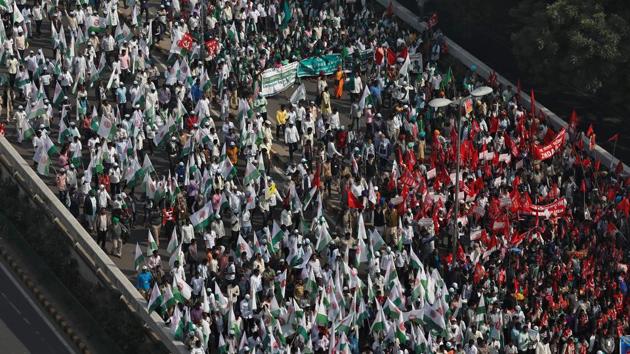Assembly election results 2018: Farm crisis deals a blow to BJP’s election harvest
Farm exports grew five times between 2004-05 and 2013-14 (from $8.7 billion to $42.6 billion), ICRIER data show. They fell to $33 billion in 2016-17 due to global factors. In Madhya Pradesh, farmers got up to 22% negative returns on soyabean (2016-2017). Onion growers in Rajasthan sold -21% below cost of production.
The Bharatiya Janata Party (BJP) ceded vast electoral territory on Tuesday to the opposition Congress because of sweeping rural anger brought on by a precipitating farm crisis.

The Congress won handily in Rajasthan, Madhya Pradesh and Chhattisgarh, states held by the BJP.
Poor farm returns pinched rural pockets, even as Prime Minister Narendra Modi said he was committed to doubling farmers’ incomes.
Professor Mohanakumar S, an economist at the Institute of Development Studies in Rajasthan, where the BJP was routed, put it succinctly: “Rural economic discontent and rural politics collided.”
Economics
Doubling of farm income isn’t realistic and actually angered farmers selling their produce at a loss, economists say. To double inflation-adjusted incomes of farmers by 2022-23 (with 2015-16 as the base year), annual farm growth will have to be 10.4%, according to Ashok Gulati, a leading economist.
In contrast, farm growth declined 0.2% in 2014-15. The next year, it grew just 0.6%. In 2016-17, growth did go up to 6.3%. In 2017-18, it slowed again to 3%. Average growth so far: about 3%.
To be sure, the first two years under the Narendra Modi government were drought years, which pulled growth down.
“A lot of discontent among farmers fomented anti-incumbency all around,” Mohanakumar said.
The government’s decision to invalidate Rs 500 and Rs 1,000 notes in November 2016, right in the middle of winter sowing, is said to have delivered a big shock because the farm sector runs on cash. “But there is no conclusive empirical evidence of this yet,” said DK Joshi, chief economist at the ratings firm Crisil. Still, in an official report this month, the farm ministry had said demonetisation “affected the farming community” in millions, which it later retracted.
Falling farm exports, a key source of farm incomes, worsened the crisis.
Farm exports grew five times between 2004-05 and 2013-14 (from $8.7 billion to $42.6 billion), ICRIER data show. They fell to $33 billion in 2016-17 due to global factors. In Madhya Pradesh, farmers got up to 22% negative returns on soyabean (2016-2017). Onion growers in Rajasthan sold -21% below cost of production. (This is according to the “C2 measure” of cost of cultivation, which includes actual costs of seeds and fertilizers etc, plus the notional value of family labour, rent and interest on owned land and capital.)
Out of 24 agricultural items, there were gluts in at least 21. As output grew, prices fell, stoking distress. The government’s steps to buy out oilseeds and pulses didn’t help.
Politics
Restive farmers began establishing inter-state networks.
In 2016, protests in Madhya Pradesh turned deadly when police opened fire, fatally shooting five.
This year, Raju Shetti, a Lok Sabha MP and farm leader from Kolhapur, Maharashtra’s sugarcane hub, gave out a call to stop supplies of fresh milk as prices fell. In 2017-18, milk output jumped 6.5%; so prices fell. “Farmers are getting Rs 16 for a litre. They need at least Rs 25-27 to be profitable,” Shetti said.
His call resonated in MP and Rajasthan.
“Farmers are trying to say they’re simply fed up,” said Yogendra Yadav, leader of the political party, Swaraj Abhiyan. Professor Manu Gautam of the Madhya Pradesh Institute of Social Science Research said Madhya Pradesh chief minister Shivraj Singh Chouhan’s cash-transfer scheme (called Bhavantar) benefitted either large farmers or middlemen, but something else was going on too.
“Savarn (upper castes) expected reservation from the BJP but when Chouhan publicly said no one dare touch reservation for lower castes, it angered his core voters and sealed his fate,” Gautam said.




